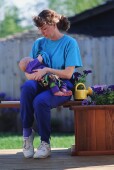
MONDAY, OCT. 4 (HealthDay News) — Most American women underestimate their ability to prevent obesity in their children, according to a new survey.
Research has shown that mothers have a stronger effect than fathers on a child’s weight. But this survey found that while 87 percent of women believe a parent’s obesity affects a child’s risk of becoming obese, only 28 percent “assign that responsibility to themselves.”
The WomenTALK online survey of 1,037 women 18 and older also found that only 11 percent of respondents know that a child’s risk of becoming obese more than doubles if the mother is obese during her first trimester of pregnancy.
The survey was released Oct. 4 by HealthyWomen, an independent health information source for women.
Mothers are role models for their children’s eating habits and also act as “gatekeepers” of food, explained Elizabeth Battaglino Cahill, the group’s executive director.
“From an early age, children tend to eat the same foods as their parents, especially mothers, so exposure to nutritious foods like fruits and vegetables is not only setting a good example, but also positioning your child on a lifelong course of good health,” she said in a HealthyWomen news release.
The survey was conducted in order to assess women’s understanding about obesity and its impact on them and the health of their families. It found that most respondents know that obesity leads to an increased risk for health problems such as high blood pressure (93 percent), type 2 diabetes (89 percent), and heart disease (88 percent).
However, less than one-third of the women know that obesity is associated with increased risk of colon cancer (26 percent), gallstones (30 percent), and breast cancer (23 percent).
Most of the respondents (80 percent) agree that other people’s obesity can influence their risk of becoming obese, but only 28 percent recognize the important role played by friends. Research has shown that a person is more likely to become obese if they have a friend who is obese (57 percent increased risk) than if they have a sibling (40 percent) or spouse (37 percent) who is obese, according to HealthyWomen.
“Women need to be their own advocates in the fight against all of these diseases, and understanding the influence that family and friends have on the likelihood that they will become obese is part of what’s slowing them down,” Battaglino Cahill said. “We need to help women understand that they have the opportunity to positively wield their influence by taking charge of their own nutrition and physical activity habits.”
HealthyWomen has created an online resource center (http://www.healthywomen.org/womenTALK) that offers advice and health tools such as exercise videos, family-friendly recipes and calculators for body mass index and target heart rate.
“Empowering and educating women is the best way we know to break the cycle of obesity and promote healthy habits for the life of any woman and her loved ones,” Battaglino Cahill said.
More information
The U.S. National Women’s Health Information Center has more about overweight, obesity and weight loss.

